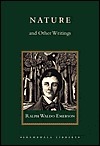What do you think?
Rate this book


"The mind of Emerson," literary critic Harold Bloom once wrote, "is the mind of America." Indeed, Ralph Waldo Emerson's essays contain some of the most memorable and important expressions of American thought. Generations of readers have been stirred by Emerson's ideal of self-reliance, and his vision of nature as a manifestation of the divine spirit has profoundly influenced American naturalists and environmentalists from Thoreau's time to the present. Poets as diverse as Emily Dickinson, Robert Frost, and Allen Ginsberg were inspired by the transcendental flavor of Emerson's work. This volume brings together selections from Emerson's best-loved writings, particularly drawing upon his early work, which is some of his most poignant. Included are excerpts from Nature, the famous "Divinity School Address," "Self-Reliance," "The Over-Soul," "Compensation," "Spiritual Laws," "The Poet," and "Circles." Several of his most moving poems appear here as well.
160 pages, Hardcover
First published August 2, 2010